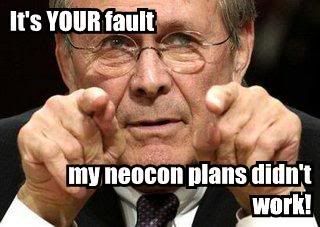
Donald Rumsfeld has finally said he's sorry. Sort of.Just like Rumsfeld was shocked over the photos from Abu Ghraib, it wasn't the torture, it was the outing of the torture. It's weirdly semantic. He and his cohorts still haven't understood exactly WHAT the world's revulsion is all about.
In an interview with biographer Bradley Graham, the former secretary of defense says he has regrets about the administration's controversial detainee policy.
The twist is that Rumsfeld doesn't regret the policy itself -- specifically the abandoning of the Geneva Conventions for detainees picked up in Afghanistan. Rather, he regrets how the policy was formulated.
In comparison to this feeble reasoning, Robert McNamara's repentance appears saintlike.:
Update, emptywheel has more.HUFFINGTON POST: In the course of producing the Fog of War what did you learn about Robert McNamara? And how did he see his place in history?
MORRIS: There are no simple answers to those questions. He is an extraordinarily complex figure and will probably remain as such... It is an amazing career and an amazingly complex career I might add. I don't share this view that McNamara is this clearly evil man. I think that he is extraordinarily complex and that may be a result as well of the extraordinarily complex history that he was part of. Nothing has a simple answer. Maybe nothing ever does. It's very easy to condemn him for these policies but harder to understand what his role was in these policies.
By the end of his life, McNamara clearly felt a sense of contrition. But did he feel as if he was responsible for what happened in Vietnam or did he think of himself as a victim of history, engulfed by the events that surrounded him?
I think that it is part of who we are, in general, that we would prefer to see ourselves as victims rather than as villains. Having said that, dealing with McNamara was dealing with a person who agonized about his past.
crossposted at SteveAudio
No comments:
Post a Comment